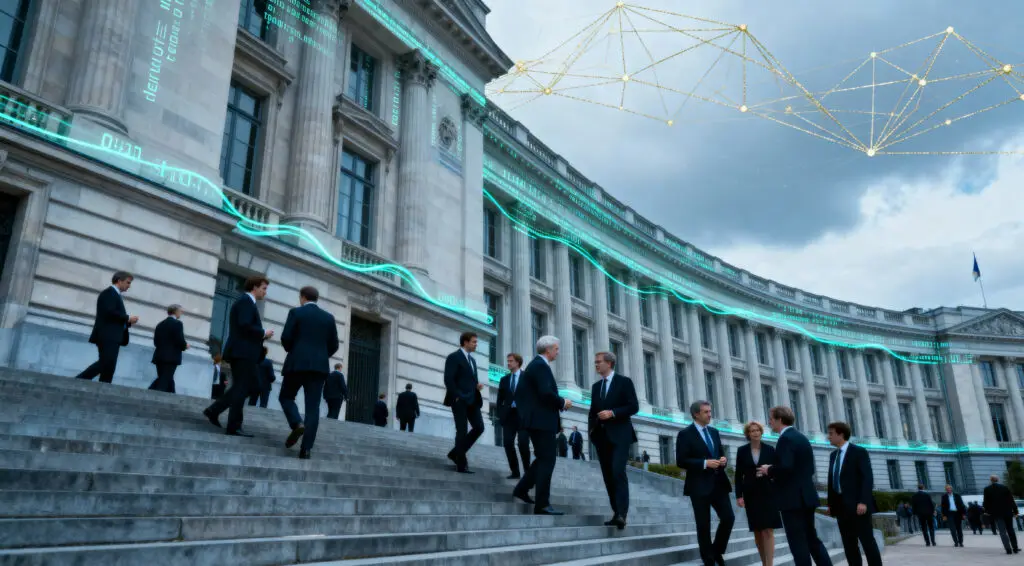EU Considers Delaying AI Act Implementation
The European Commission is thinking about putting off some elements of the EU Artificial Intelligence Act, which is the first full set of rules for AI in the world. The move comes after large tech companies and the Trump administration put a lot of pressure on Europe to make it easier for AI developers to respect the rules.
A representative for the Commission said that “a reflection is still ongoing” about putting off some measures. The discussions are meant to allow businesses more time to get used to the complicated compliance rules, although a final decision has not yet been reached.

Details of the Proposed Delays
The Financial Times says that Brussels is thinking about giving AI providers that break the tightest standards for high-risk systems a year to fix their mistakes. These include AI models that are thought to have “serious risks to health, safety, or fundamental rights.”
If a company’s generative AI systems, like those that make text, graphics, or code, hit the market before the full enforcement date of the act, they may also have more time to comply. This step is meant to make sure that compliance happens without getting in the way of creativity.
The Commission is also talking about putting off fines for breaking AI transparency regulations until August 2027. This would give providers and deployers more time to put in place new reporting standards.
More Flexibility for High-Risk AI Systems
MLex published a different study that said the Commission is looking into measures to make compliance easier for AI developers who work with high-risk technology. The proposed changes would let companies follow less strict monitoring rules, which would make things easier for them while still keeping an eye on how the market is doing.
Officials said that these adjustments might yet alter before they are set to be published on November 19, 2025. Once the plans are finished, they need to be approved by the European Parliament and the countries that are part of the EU.
Recommended Article: UNESCO, CANIETI Launch Ethical AI Model for Mexico
The Trump Administration’s Pressure on Brussels
The argument surrounding the AI Act has gotten more and more political. The Trump administration has told Brussels many times to ease off on rules for computer companies. They have also warned that “anti-American” digital rules may lead to trade retaliation.
President Trump has even said he might put tariffs on countries that have tech rules or digital taxes that hurt U.S. businesses. His position is part of Washington’s larger endeavor to keep Silicon Valley competitive on a global scale as regulations get stricter in other countries.
Tech Industry Pushback Against Regulation
Big businesses like Meta, Microsoft, and Google have spoken out against Europe’s ambitious plan to regulate AI. Meta refused to accept the EU’s code of conduct for general-purpose AI models because it thought it went too far beyond the AI Act’s initial goal and caused “legal uncertainties.”
Joel Kaplan, Meta’s Global Affairs leader, said that “Europe is going in the wrong direction on AI.” He said that too many rules might slow down innovation and investment in Europe’s IT sector.
But the criticism hasn’t just been aimed at American companies. Several European companies have said the same thing, asking for additional time to comply.
European Companies Urge a Two-Year Pause
Forty-six big European companies, like Airbus, Lufthansa, and Mercedes-Benz, signed an open letter asking for a two-year delay in the AI Act. The people who signed noted that the delay will show that the EU is “serious about its agenda for simplification and competitiveness.”
They said that putting the laws into effect too quickly might hurt European entrepreneurs by making it tougher for them to compete with less regulated markets like the U.S. and China. The letter stressed how important it was for companies to have a “reasonable implementation” and a seamless transition.
European Lawmakers Warn Against Weakening the Law
Not all EU officials support the postponement of the AI Act. Brando Benifei, an Italian Social Democrat involved in drafting the law, criticized any delays, arguing they would generate legal uncertainty and jeopardize public safety. He emphasized the Act’s goal of balancing innovation and safety.
Thomas Regnier from the European Commission reinforced the EU’s authority in establishing its technology regulations, asserting that external entities should not dictate EU lawmaking, thus underscoring a commitment to ethical governance and AI accountability.
Europe’s Balancing Act Between Innovation and Regulation
The ongoing discussion shows how hard it is for the EU to strike a balance between encouraging scientific progress and making sure AI is used in a way that is ethical, safe, and open. As the world watches more closely, any delay might hurt Europe’s reputation as the world’s leader in responsible AI regulation.
When the Commission reveals its changes later this month, people will have to decide if the suggested grace periods are a reasonable way to be flexible or a sign of political retreat.























